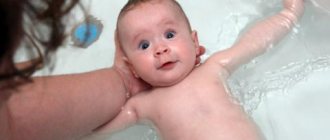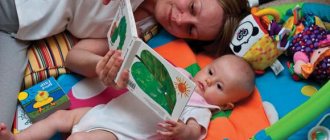Body changes and new sensations for women
All new changes and sensations signal the onset of an “interesting situation.” "I am pregnant!" - a woman exclaims (often with surprise) without waiting for her period to start. The absence of menstruation is the most obvious and reliable sign of pregnancy, which every representative of the fair sex knows about. Signs of pregnancy in the early stages may also be the following: nausea (especially in the morning), increased sensitivity to various odors, fatigue, drowsiness, enlargement and engorgement of the mammary glands, increased basal body temperature, changes in appetite and taste preferences, unreasonable mood swings, increase in hCG concentration.
What's New in a Growth Spurt at 5 Weeks?
From now on, your baby will no longer sleep all the time. You'll notice that between feedings this little guy doesn't mind having fun! For now, the waking time is only 20-30 minutes, so try not to overload the baby’s psyche. After the crisis, a month-old baby will certainly begin to surprise you:
- He will begin to look at various objects longer and more often. It's time to get out the first toys! But no more than 1-2 at a time.
- The baby listens more and reacts to different sounds in different ways. Previously, he didn’t give a damn about them, to put it mildly.

- Enthusiastic sounds and sounds signaling dissatisfaction appear. I heard that kids pronounce consonants when they are happy, and vowels when they are dissatisfied with something.
- The child smiles much more. And finally, he does this not only in his sleep, but also dedicates his smile to you personally!
- Now the baby will cry with tears. Just in time for the age of 5 weeks, the tear ducts open. Oh, it would be better if they cried without tears, by God! No mother's heart can stand...
- Feels touch more clearly. Plus, he likes them, so provide your baby with as much physical contact as possible.
Quite a list of achievements in such a short time! We have the power to alleviate the temporary suffering of our children. A growth spurt of 5 weeks is just the beginning of a long, difficult, but incredibly interesting journey. Everyone has been through this. Remember how important your mission is - helping a new person grow and develop! What could be more important? Strength and patience, friends. All your efforts will pay off in full.
In the following articles I will talk about other crises in the life of a baby, so subscribe to blog updates so you don’t miss anything. I also highly recommend studying the calendar of age-related crises for a child up to one year old in order to be fully prepared. See you soon!
Nutrition at 5 weeks of pregnancy
If you haven’t planned a pregnancy and haven’t thought about your diet before, now it’s simply necessary to do so. Nutrition during pregnancy should be balanced and enriched with healthy vitamins and microelements. Avoid junk food (such as fast food). Enrich your diet with dairy products, vegetables and fruits.
To minimize the discomfort from early toxicosis, doctors advise, when you wake up, not to get out of bed abruptly, but to lie down for a while and eat cookies or nuts. Try replacing meat products and eggs with legumes, limit your consumption of fatty and fried foods, and sweets. Green tea with lemon, rosehip infusion, and cranberry juice help well with toxicosis. To avoid a feeling of fullness in the stomach, you should drink in small sips.
When does a baby develop memory?
It is believed that children can even remember what they felt and heard in the womb .
And this is true, although the child’s memory in the uterine period differs from our usual understanding - it is mainly unconscious and is based on remembering sensations and sounds. And this is not surprising, because adults 90% of visual sources of information to build a picture of the world, and the child perceives the environment through the mother’s reactions at the chemical level.
Functionally, the child’s memory begins to form after the 30th week of development in the womb. During this period, neuronal cells rush to the hippocampus, an area of the brain that is directly responsible for storing information and forming long-term memories.
Therefore, even in the womb, the child remembers the voices of his parents and begins to react, for example, when he hears his mother speak.
Vitamins
The ideal option is when the doctor leading the pregnancy advises the woman what to take during the 5th week of pregnancy and in what quantity (an individual approach is still important in this matter!). We will note the importance of only some vitamins in week 5. Thus, it is known that every second pregnant woman experiences a deficiency of folic acid, an essential element for the formation of the baby’s organs and systems (primarily, we are talking about the nervous system). Folic acid is essential during pregnancy! In addition to special tablets, it is found in spinach, asparagus, carrots, peaches, avocados, beans, hazelnuts, dark rye flour, eggs, liver and cheese.
For the correct formation of the embryo, an uninterrupted “supply” of B vitamins to the body is required (these are cereals, legumes, apricots, carrots, beets), vitamin C (black currants, sea buckthorn, cabbage, strawberries), as well as iodine and magnesium (seaweed, bananas).
Causes of the crisis 5 weeks
Yes, all these problems exist, but the real reason for constant anxiety is the change in the baby’s sensory organs. During the first few weeks, the baby recovers from childbirth, gains strength and therefore sleeps almost all the time. But at the age of a month, the child suddenly begins to see better, distinguish sounds, and recognize the faces of mom and dad. The world is becoming full of new sensations!
The difficulty is that the baby does not yet know how to process impressions from his senses in the same way as adults do. Imagine: you fell asleep in darkness and silence, in your warm, cozy bed, and woke up in the middle of a noisy station, where trains are whistling, the patter of feet of people running somewhere is everywhere, the pungent aromas of fried pasties are in the air...
Therefore, naturally, the baby becomes more restless than before. He needs some time to get used to a huge number of external stimuli. This usually takes from one day to a week . Only! So be patient, dear parents, everything will get better soon! There is no need to run to the doctor, for formula or to grandma, thinking that your child has been jinxed. Most likely, everything will pass as abruptly as it began, and the baby will very soon give you his first meaningful smile.
Personally, I didn’t notice this crisis at all, because the first month my daughter cried quite a lot. But I’m sure that he was, because after the 5th week - it was like it was cut off. By the way, what generally changes after the first growth spurt?
Lifestyle
The period is still very short, but the embryo is already becoming dependent on the emotional state and lifestyle of the expectant mother. Therefore, a woman should not be nervous! You need to try to be calmer and not worry about trifles. Stop drinking alcohol, smoking, and avoid contact with sick people. And surround yourself with beautiful objects! So, in the East it is believed that a pregnant woman must look at something beautiful - then she will certainly give birth to not only a healthy, but also a very cute baby.
Physical development and growth of a child 6 weeks from birth - how has a one and a half month old baby grown?
Your baby has not only become one week older, but has also increased in height, body weight, and has also learned a lot over the past 7 days.
- Height and weight. By 6 weeks the baby had gained about 200 g (30 g per day), the change in height was not significant (the gain was no more than 1 cm). In general, the average monthly gain is now about 3 cm (from the moment of birth, the increase in height is about 4.5 cm, and the increase in the chest is 2 cm). The average weight gain since birth is about 800 g.
- Night feeding is still there (about 3 am). 9 hours are allocated for night sleep (from 9 pm to 6 am).
- to sleep , and about 5-6 hours to be awake.
- The volume of food has not changed : per day - 1/5 of body weight (about 600-800 ml).
- Number of feedings - 7 times/day. Complementary foods cannot be introduced yet. If there is not enough milk, then formula is introduced. Be sure to give your child water.
- Bowel movements at week 6 - 3-4 times a day, or after each feeding. Constipation is not considered a good indicator; if it occurs, then reconsider your diet or mixture.
- Physiological development. The movements of the 6-week-old baby are not yet particularly coordinated, the fingers are in fists, the arms are bent at the elbows. Visual achievements: the baby can fix his gaze on an object for a long time, he catches the mother’s movements. Watch your child: if there is pain in the ear, the child may turn his head violently, and if his tummy is bloated, his legs may wag.
- How long to walk with the baby, how to dress? The baby is not yet warming himself, so we wrap him up well for winter walks so as not to freeze. For a winter walk, 1 hour is enough; for a summer walk, there is no such thing as too much fresh air.
Regurgitation in a 1.5 month old baby - why does it happen and how to deal with it?
There are two reasons for this phenomenon - the extensibility of the gastric walls and the underdeveloped sphincter (“lock”) of the entrance to the stomach (like a bottle without a cap). When sucking, the stomach stretches, then the muscles of the gastric wall contract, and the milk “splashes out” out.
What should I do?
During the feeding process, we tear the baby off the breast several times and hold it vertically for 3-4 minutes.- We wait until the air swallowed with milk rises above the milk and exits independently through the esophagus without accompanying liquid.
- The breast should be given in such a way that the little one grasps the nipple with his mouth along with the areola.
- If artificial feeding, make sure that the neck is completely filled with milk during feeding.
- After feeding, we place the baby on her side, slightly raising the crib under her head, and wait until the milk is absorbed.
- Remember that too frequent and severe regurgitation may hide a pathology. If, with constant and profuse regurgitation, weight loss is also observed, consult a surgeon.
Child development stages by week
Prenatal period
The child in the womb perceives and remembers information from the outside world thanks to the mother’s hearing and sensations due to certain hormones. Despite the fact that it is believed that the baby learns to move consciously at 3-4 months, he actively performs organized actions.
Week 12
From the 12th week, the baby begins to hear and develops the ability to distinguish sounds from the environment.
1st week of life
The newborn gets used to the daily routine, recognizes the sounds and smells that precede feeding: the clinking of dishes, the sound of a bottle warmer, the smell of warm milk.
2 weeks
At two weeks after birth, the child already remembers and clearly perceives in an inseparable image the voice and appearance of the mother.
1 month
The baby begins to remember the voices of all family members that it hears. During this period, the child’s vision is quite weak, but he actively observes the world around him with eye movements.
1.5 months
The child begins to remember the emotions that parents convey through facial expressions. At the same time, he understands in what situations certain grimaces are used.
2 months
From the second month, the child begins to distinguish simple contrasting colors, so he begins to pay attention to bright colored toys and follow them with his eyes. At this age, the memory of cause-and-effect algorithms, which is more familiar to adults, begins to manifest itself. He is able to isolate people present from surrounding objects.
3 months
In the third month, the child develops the ability to distinguish the shapes of objects. The time for storing the image in memory increases and becomes more than 1 second.
4 months
The ability to fix new images in memory for more than one second continues to develop. During this period, the child begins to recognize the visual image of the mother at any time of the day and distinguish the faces of familiar people from unfamiliar ones.
6 months
The child begins to realize the differences between objects in their sizes and when playing with the disappearance of a toy, he understands perfectly well that it still exists, it is simply not visible.
8 months
At this age, the negative reaction to unfamiliar people’s faces intensifies, this is especially pronounced if the child is left alone with a stranger.
The so-called “Fear of Separation” begins to form - if the mother goes into another room and is gone for a long time, the child begins to worry and makes this clear with a loud cry. From this age to 12 months, the baby manifests and develops the ability to recognize various objects, toys or things not only as a whole, but also in their individual parts, this means that the child begins to develop long-term memory.
9 months
By this period, the child begins to show signs of thinking through sensory-motor intelligence. The baby begins to realize that the words he hears are not just certain sounds, but also have meaning.
1 year
Long-term memory continues to form. When communicating with mom or dad, the child strives not only for emotional contact, but also for joint action, involving parents in something, for example, pointing with a finger at what needs to be looked at together.












